 MyDogBreeds
MyDogBreeds Neapolitan Mastiff is originated from Italy but Eurohound is originated from Norway. Both Neapolitan Mastiff and Eurohound are having almost same height. Neapolitan Mastiff may weigh 55 kg / 122 pounds more than Eurohound. Neapolitan Mastiff may live 6 years less than Eurohound. Both Neapolitan Mastiff and Eurohound has almost same litter size. Neapolitan Mastiff requires Moderate maintenance. But Eurohound requires Low maintenance
Neapolitan Mastiff is originated from Italy but Eurohound is originated from Norway. Both Neapolitan Mastiff and Eurohound are having almost same height. Neapolitan Mastiff may weigh 55 kg / 122 pounds more than Eurohound. Neapolitan Mastiff may live 6 years less than Eurohound. Both Neapolitan Mastiff and Eurohound has almost same litter size. Neapolitan Mastiff requires Moderate maintenance. But Eurohound requires Low maintenance
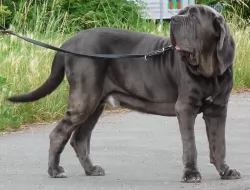 An ancient breed, the Neapolitan Mastiffs are massive dogs with a history of protecting their family and their property. The breed has deep rooted protective instincts and they are very frightening in appearance. The Neapolitan is of the Molosser group of dogs, all of whom probably came from the same line. It is known that all the mastiffs in Europe are descendants of the Tibetan Mastiff. The Tibetan Mastiff is considered the most ancient of all canines.
An ancient breed, the Neapolitan Mastiffs are massive dogs with a history of protecting their family and their property. The breed has deep rooted protective instincts and they are very frightening in appearance. The Neapolitan is of the Molosser group of dogs, all of whom probably came from the same line. It is known that all the mastiffs in Europe are descendants of the Tibetan Mastiff. The Tibetan Mastiff is considered the most ancient of all canines.
The Asian Mastiffs came from India to Greece around 300 BC with Alexander the Great. Then the breed was brought to the Romans by the Greeks and then introduced them in their circus in fights. Another possibility is that around 500 BC the mastiffs came to Britain from the Phoenicians. Either way the Roman Molossus is the ancestor of the Neapolitan Mastiff.
The Romans crossed the breed with the English Mastiff around 55 BC and developed a premiere war dog that was called a Mastini.
The breed eventually became extinct in Europe with the exception of Campania. The breed was recognized in 1946 with the standard accepted in 1949. However, it is believed that the Neapolitan Mastiff has been continuously present in Campania for over two thousand years. The breed was initially developed as war dogs and for the Roman coliseum spectacles.
In 1946 Dr. Piero Scanziani established a program to breed them in Italy. He wrote the breed standard in 1949.
Today the Neo is a farm dog, an army dog, a police dog and a guard dog. They were shown in Italy for the first time in 1946 but only in 2004 was the breed recognized by the American Kennel Club (AKC). It was 1973 when the Neapolitan Mastiff Club of America was born and 1996 when the standard was approved by the AKC. They are still a rare breed in the United States.
 Sled dog racers wanted something unique and hardy in their dogs and the Eurohound seemed to be the dog that fitted the bill.
Sled dog racers wanted something unique and hardy in their dogs and the Eurohound seemed to be the dog that fitted the bill.
It was in the 1980s that both Norway and Sweden started crossing the Husky and the Pointer for the first time.
The Eurohound, known also as the Scandinavian hound, is a cross between a German Shorthaired Pointer and an Alaskan Husky as well as other Pointer dogs.
Hailing from Norway, Scandinavia, it isn’t a purebred dog but a cross-breed, and the term ‘Eurohound’ comes from a certain Ivana Nolke so as to distinguish the European racing dogs imported into Alaska.
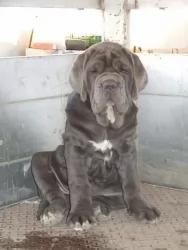 The Neapolitan Mastiff is a massive dog , so powerful and very intimidating in his looks. With an incredibly large head and hanging folds and wrinkles, the Neo is an impressive animal. His inner nobility and dignity is evident in his stance and the way he holds himself. He is relaxed, calm, quiet yet imposing none the less. His coat is dark whether black, tawny, gray or mahogany. He is muscular beyond imagination. The Neo is 10-15% longer than he is tall.
The Neapolitan Mastiff is a massive dog , so powerful and very intimidating in his looks. With an incredibly large head and hanging folds and wrinkles, the Neo is an impressive animal. His inner nobility and dignity is evident in his stance and the way he holds himself. He is relaxed, calm, quiet yet imposing none the less. His coat is dark whether black, tawny, gray or mahogany. He is muscular beyond imagination. The Neo is 10-15% longer than he is tall.
On his massive head his eyes are deep set and covered by his eye lids that droop. His eyes are blue as puppies then dark and coordinated with his coat. and his nose is large and the color of his coat. Ears are natural or can be cropped, and they carry their tail straight and curving back. The Neo has round paws and arched toes.
 The Eurohound is a carefully bred dog considered to be a large dog standing up to 72 cm in height and weighting in the region of 18-24 kg.
The Eurohound is a carefully bred dog considered to be a large dog standing up to 72 cm in height and weighting in the region of 18-24 kg.
With its mission being to be a sled dog, it is constantly being crossbred with other cross- breeds to produce dogs to suit the pulling of sleds. Because both the Husky and Pointers have been used in its breeding, who knows really how its appearance will be as it can vary quite a bit.
There are however, some common features in the dogs such as the half dropped ears. More Eurohounds have black ears with white markings. The dog is a slender breed with a longish face and a long muzzle. Certainly it is known for being a powerful sled dog. The short, shiny dog can be in a number of colors such as cream, beige white, red, black, spotted or patched.
Social, extrovert and energetic, the Eurohound also loves to be busy. Its a dog who forms a strong relationship with its owners, being affectionate and loyal. While he is quite able to live in the city or the country, he essentially needs large premises as he loves to run and be free.
He most certainly isn’t a working dog breed who can be left on his own in the backyard until you need him to pull a sled as he craves your companionship. He is an independent and stubborn dog and therefore training and socialization will b excellent for him as it makes him understand who is boss in the home.
He is a dog who gets on well with other pets in the home as well as children.
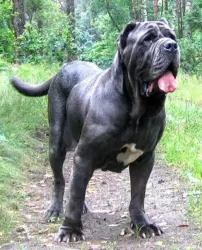 Older children in their family. No toddlers or strangers.
Older children in their family. No toddlers or strangers.
Protective yet quiet, calm, relaxed
No they won’t adapt well to apartment living or to strangers.
They are intelligent and trainable but must be socialized and know the human is the alpha or they will take over.
 Full of bounce, social and extroverted, while also being independent and stubborn, the Eurohound just loves being around his human family, bonding strongly with them, whether they are adults, children or even other pets in the home.
Full of bounce, social and extroverted, while also being independent and stubborn, the Eurohound just loves being around his human family, bonding strongly with them, whether they are adults, children or even other pets in the home.
You’ll find that your Eurohound is an intelligent dog too and that he can be easily trained. He loves to be active, so to put him in your backyard and all but forget about him would be cruel. They are loyal, loving dogs who want to be part of all your activities, being ready to walk and run with you whenever the opportunity arises.
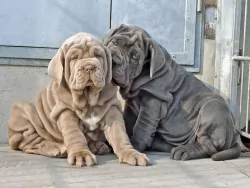 The Neapolitan Mastiff is prone to many of the same issues as any massive, extra large breed. The most common of these is Cherry Eye.
The Neapolitan Mastiff is prone to many of the same issues as any massive, extra large breed. The most common of these is Cherry Eye.
 Considered as a healthy dog breed and able to live up to 10 – 15 years of age, just some of the most common reported health problems you might find with your Eurohound are hip and elbow dysplasia.
Considered as a healthy dog breed and able to live up to 10 – 15 years of age, just some of the most common reported health problems you might find with your Eurohound are hip and elbow dysplasia.
Hip dysplasia is where the joint – the ball and socket – is malformed so that instead of working smoothly it grinds. It is one of the most common skeletal diseases in dogs and large breeds are mostly affected. Hip dysplasia can lead to osteoarthritis, pain and lameness.
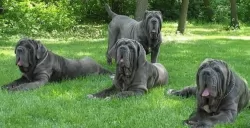 Neapolitans grow fast and so don’t overfeed when they are young. Lower protein and higher fat content.
Neapolitans grow fast and so don’t overfeed when they are young. Lower protein and higher fat content.
Don’t overfeed the adult as they can become obese.
This big hearty breed needs exercise but not too much. They overheat easily. The puppy will push himself, so you have to make sure he doesn’t over do it. No tug of war games. They need a long walk twice every day.
 The Eurohound is an energetic dog who will require a high-quality nutritious food. Home made dog foods are wonderful but in the event that it isn’t always possible, make sure you buy top quality commercially manufactured food.
The Eurohound is an energetic dog who will require a high-quality nutritious food. Home made dog foods are wonderful but in the event that it isn’t always possible, make sure you buy top quality commercially manufactured food.
Your vet can advise you on the type of food to use for your pet if you are unsure. Certainly, if you feed your dog kibble, take a good look at the ingredient label on the pet food packaging. If you are interested in your dog’s health in terms of food, you will learn about protein/fat ratio and how much moisture is in the food and what vitamins are included.
Remember to occasionally include cooked brown rice, vegetables and chicken as well as some raw meat from time to time.
The Eurohound isn’t a big shedder but you will still need to ensure that you brush his short coat twice a week to keep it in tip top condition.
These are dogs which bond closely with their human family so this grooming period will be therapeutic to him.
Check his ears inside and out for the development of ear infections and brush his teeth twice a week with a special dog toothbrush and tooth paste. Dental disease can cause a host of serious illnesses and you want to avoid this with your dog,